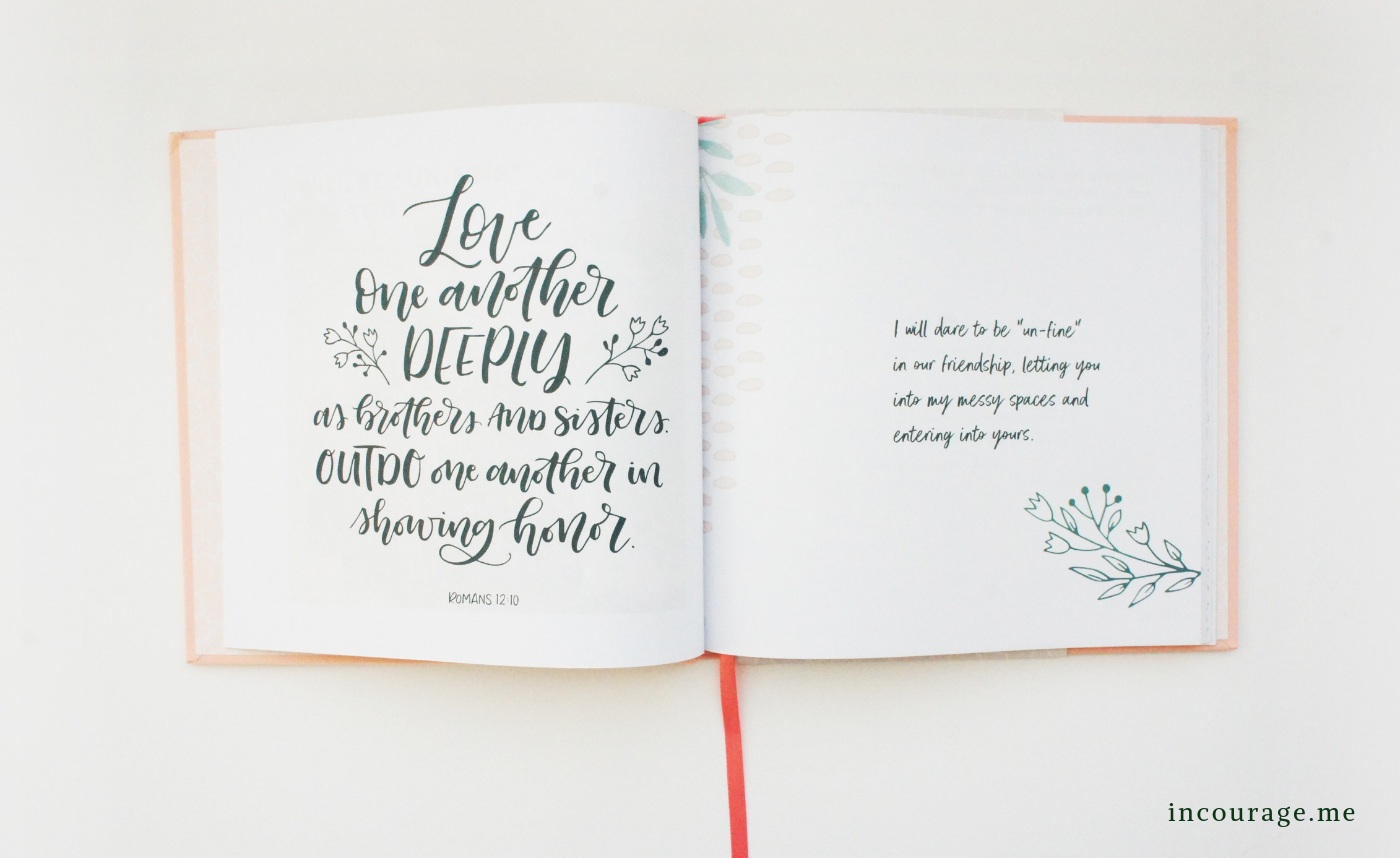We’ve spent the last two years talking about friendship, about our cravings for connection. We’ve talked about the way Jesus will never unfriend us, how He is the ultimate friend. We’ve heard from you as you bravely pursue friendship, and we’ve studied the way friendship is woven throughout the fibers of Scripture.
Here’s a sample of what we’ve focused on, written by our friend Lisa-Jo Baker:
Nothing is riskier or more vulnerable than cracking open the doors of my messy home, let alone the doors of my actual life. I get so used to neatly packaged people and stories and families that I can forget how to be anything but “fine” when someone asks. Because, deep down, there are messes much messier than the dust bunnies or gritty dishes. There are fears and doubts and despair and broken places that cut so deep it takes the breath away.
I nod and smile and say I’m fine, the kids are fine, work is fine, marriage is fine, just fine, thanks for asking. And all the while, there’s this big, messy, gaping wound bleeding raw right through my perfectly fine outfit that I hope no one notices. All the while, I’m desperate for somebody to care enough to see.
You will know the truth, and the truth will set you free.
John 8:32 (NIV)
Fine is so dangerous, isn’t it? Fine means the end of a conversation, the beginning of nothing. Now it’s time for the battle cry that if Truth can set us free, it’s best to start living in those places. Maybe going first and admitting my un-fine isn’t a weakness; instead, I will see it as a gift to you, who can finally exhale and admit your un-fine too.
This is my friendship promise to you.
Let’s do it. Let’s be un-fine together, eh? And now we have a great resource to help you do just that . . . and a BOGO deal to go with it!!
Introducing the newest book from the (in)courage community!
Featuring reflections about friendship from both Never Unfriended by Lisa-Jo Baker and Craving Connection from the (in)courage community, Friendship Promises combines beautiful graphics with devotional reflections, prayers, Scripture, and journaling prompts. If you loved Never Unfriended and Craving Connection, then Friendship Promises needs to be on your bookshelf.

Friendship Promises is also a fantastic gift for the friends in your life — new ones, old ones, and the ones you really want to know just how much they mean to you. This gift book, meaningful for both the giver and the recipient, starts off with a promise:
In our friendship, I promise to be:
- Authentic
- Present
- Encouraging
- Rooted in Christ
This is my friendship promise to you.
Sharing these encouraging words will help friends walk confidently toward a sweet, strong relationship grounded in honesty, kindness, and devotion to God and one another.

Grab two copies of Friendship Promises, then slip the extra into a friends purse at church, invite a friend to meet you for coffee and slide it across the table, or drop by your neighbors’ and leave it on the porch as an unexpected gift. However you decide to share it, we know Friendship Promises will be a blessing for your heart and hers!
Leave a Comment







Lisa-Jo,
Emily P. Freeman in her book Grace for the Good Girl talks about taking off the masks we wear. Being authentic & real. Quit saying fine. Personally I’m tired of hearing fine. I want to know how you’re really doing-deep down-the hurts & disappointments that hit you. By not telling me you are robbing me of the joy & privilege of praying for you. I might also chime in a “me too”. It is high time to open up our messiness & show our friends our true selves.
I am blessed to belong to a little church where people aren’t always fine. They come clean to the vulnerable self. Even the pastor’s wife opens up about stuff. It help get the conversation started & lets us know we don’t have to perfect down here in the messy middle between two gardens.
Blessings 🙂
Bless you Beth! Your words are so real and honest! It’s inspiring xx
Beth,
I along with Jas appreciate your honesty.
I hope that you all have a blessed day,
Penny
A wise woman once told a me that a response of “fine” when asked how one feels is really… “Feelings Inside Not Expressed” (FINE). I’ve never forgotten that.
Lisa Jo, We are are using your book, Never Unfriended, in our ladies Bible study (in Cape Town, S.A.). Different ladies are teaching different chapters, which gives us a little bit of a unique take on each chapter. I came to the conclusion that – “How are you?” isn’t really a legitimate usually. It’s more of a greeting, “Hello, how are you?” – said in one breath. I knew a man (an elder in the church who was one of the best servants I knew) who informed all that he would not ask somebody how they are unless he was willing to listen to what they had to say.
Martha,
Thank you for your honesty – this is what I have discovered especially in college – people ask how are you, but only as a form of greeting, not to hear what someone has to say. Its very sad, the way todays culture has transformed words and phrases and lost their true meaning of care and concern. Its caused me to withdraw sadly, and not share how I am with anyone and even when they ask to say the usual I’m fine, because the other party clearly is not interested in the true response. Hopefully we can individually be a part of changing that and returning to the true forms of greeting and asking after ones wellbeing. Its great that you are studying this book!
How true – I have for a few weeks decided to buy this books for a good friend of mine and for myself if I can spare one. I have struggled with this fake mask of being fine, almost everyday especially through college. This probnlem ios not only for the western hemisphere I do know, but as a missionary kid (MK) I have been to a few countries where or the most part, people are more than willing to share truly their problems, almost too openly (where sometimes it turns clearly to complaining all the time) but nevertheless have been open. And so having grown up in these environments, I found it particularly stifling and hard to come back to the States for college, and feel that I must too, appear to be “fine” or “good”, because everyone around me would give these automatic answers. I thought, am I the only one who is struggling?’ and so sadly resolved to give these same one word answers as well., because I felt that no one was interested when I took the time to share, or that I was burdening people.It was and is still quite frustrating at times because I long to have my friends and even people who I meet to simply be honest. It is sad that we must encourage each other to be honest, when that really should be the way of the body of Christ, to share with each other and bear each others burdens rather than pretend that we are a picture of perfection which is clearly not true.